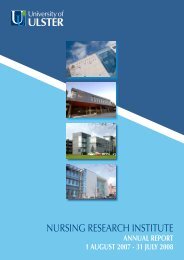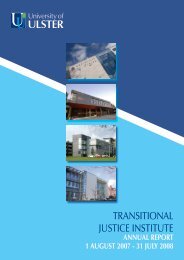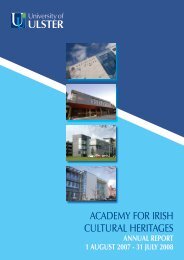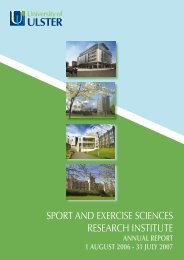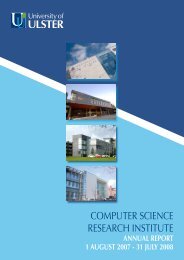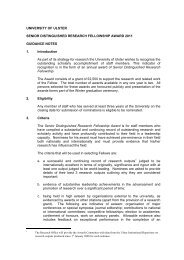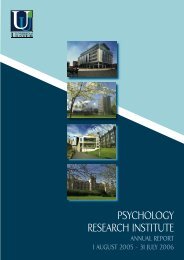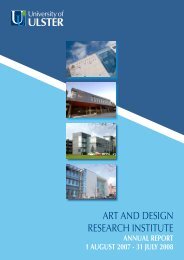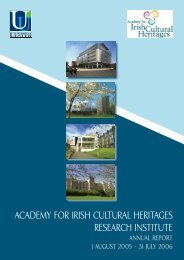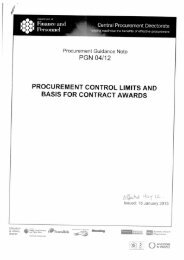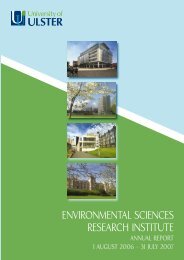biomedical sciences research institute - Research - University of Ulster
biomedical sciences research institute - Research - University of Ulster
biomedical sciences research institute - Research - University of Ulster
- No tags were found...
You also want an ePaper? Increase the reach of your titles
YUMPU automatically turns print PDFs into web optimized ePapers that Google loves.
8. MICROBIOLOGY AND BIOTECHNOLOGYRESEARCH GROUPRESEARCH STRATEGYThis Group concentrates on infectious diseases rather than degenerative diseases. Our focus is upon reaching adeeper understanding <strong>of</strong> the distribution, function and control <strong>of</strong> bacteria, protozoa and viruses <strong>of</strong> importance to<strong>biomedical</strong> science; recognising the importance <strong>of</strong> the environment as a reservoir <strong>of</strong> microbial pathogens, and as asource <strong>of</strong> micro-organisms producing novel bioactive molecules. Analytical techniques have also been applied to otherbiological materials, which may be sources <strong>of</strong> molecules with therapeutic potential. As such ‘Infection free by design’is a theme that all the members <strong>of</strong> the group currently contribute to. This is a multidisciplinary approach, involvingclinicians, industry and academia, to solving problems associated with microbial infection in a public health context.The Group is currently actively involved in the following <strong>research</strong> projects:• Biology <strong>of</strong> Clostridium difficile whose associated disease (CDAD), within the ageing population, is a significantproblem to healthcare providers worldwide. It is essential that the incidence <strong>of</strong> this disease be contained notleast given the associated mortality rate <strong>of</strong> 6-15%.• Biology <strong>of</strong> the protozoan Cryptosporidium, an intracellular parasite responsible for many gastrointestinal infections,lately spectacularly so in Ireland.• Molecular methodologies for detecting and monitoring pathogens in novel environments, and for detecting lowcopy number genes associated with the metabolism <strong>of</strong> antiviral compounds.• A set <strong>of</strong> investigations <strong>of</strong> infective agents: viral pathogenesis and mechanism <strong>of</strong> antiviral drug resistance inBunyaviridae, arthropod-borne viruses that are important human pathogens, causing emerging infections inresponse to ecological changes.• The role <strong>of</strong> protease inhibitors in combination antiretroviral therapy, that have so substantially improved clinicaloutcome in HIV infection.• Interactions between viruses, the immune system and wound healing.• Proteomic techniques and tools for the analysis <strong>of</strong> micro-organisms <strong>of</strong> emerging medical and industrialimportance.• Advances in analytical science, particularly in mass spectrometry and NMR, that underpin the proteomiccapabilities.56



